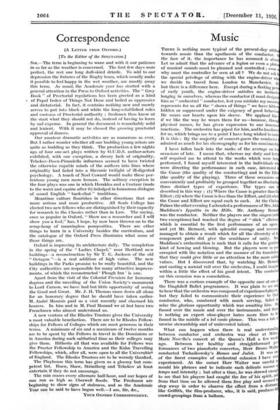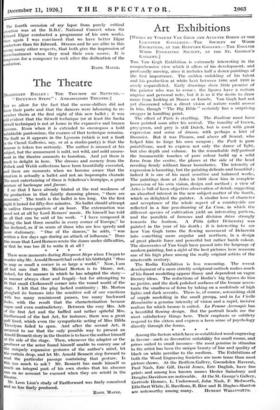Music
THERE IS nothing more typical of the present-day fatal] towards music than the apotheosis of the conductor. ( the face of it, the importance he has assumed is absu Let us admit that the advance of a legion or even a plat of musical sounds must be planned and controlled ; even why must the controller be seen at all ? We do not ask f the special privilege of sitting with the engine-driver wh, we decide to travel from London to Manchester. but there is a difference here. Except during a fleeting pe of early youth, the engine-driver satisfies no instinct: longing in ourselves, whereas the conductor (I must designa him as " orchestral " conductor, lest you mistake my meanie represents for us all the " shows of things " we have hitlie hidden or suppressed under the exigency of good behavio He wears our hearts upon his sleeve. We applaud Mtn if we like the way he wears them for us—because, throu, physical means, he has given expression to our innermo reactions. The orchestra has piped for him, and he has darn for us, which brings me to a point I have long wished to niak It is this : By the majority of concert-goers the conductor admired as much for his choreography as for his musicianshi I have fallen back into the ranks of the average on fo occasions of late. I mean that, whereas my duty and Kett self required me to attend to the works which were bein performed, I found myself interested in the individuals ah were directing the performance in each case, interested ' the Cause (the quality of the conducting) and in the Mc (the quality of the playing). Three of these occasions ca conveniently and profitably be grouped together as nista{ three distinct types of experience. The types can described in this way : (1) Where the Cause is greater than ti Effect ; (2) where the Cause is less than the Effect, and (3) min the Cause and Effect are equal each to each. At the Cheb • Palace the other evening I attended a performance of Mrs. Ad Maddison's Ippolita in the Hills. Mr. Anthony Berna was the conductor. Neither the players nor the singers (psi two exceptions) had reached the degree of " slick " efficienc• which is essential to the first performance of an opera and yet Mr. Bernard, with splendid courage and resource managed to obtain a result which for all the diversity of it component parts did give the semblance of unity. 317 Maddison's orchestration is such that it calls for the gent kind of bowing and blowing. But the players were so pre' occupied with the notation and the manner of its translation that they could give little or no attention to the more subtk values. But I discovered that, by watching Mr. Bernard and casting a mental veil over the orchestra, I could imagine within a little the effect of his good intent. The conduct°
on this occasion was a consolation. •
There was a curious example of the opposite case at one the Diaghileff Ballet programmes. It Was Plain to see and to hear that the orchestra was composed of experienced players, but they failed to communicate their experience to their conductor, who, cumbered with much serving, failed to seize the glorious opportunity which was awaiting him. lie fussed over the music and over the instruments, and then is nothing an expert oboe-player hates more than to be fussed in the middle of a bel canto phrase. This was a tale of unwise stewardship and of uninvested talent.
What can happen when there is real understandiq between conductor and orchestra was clear at Wale- Marie Novrllo's concert at the Queen's Hall a few Iceel ago. Between her healthy and straightforward Pet' formances of two pianoforte concertos, Herr Bruno Walt° conducted Tschaikowsky's Romeo and Juliet. It was one of the finest examples of orchestral cohesion I have eve experienced. At the outset Herr Walter was careful to mould his phrases and to indicate each delicate nuance of tempo and intensity ; but after a time, he was shrewd enougli. to see that his players had caught the fire of his spirit, and from that time on he allowed them free play and seemed t step away in order to observe the effect from a distAand, like Griffith, the film-producer, who, it is said, produces 1115 crowd-groupings from a balloon. The fourth occasion of my lapse from purely critical attention was at the B.B.C. National Concert when Sir Edward Elgar conducted a programme of his own works. ore again I was convinced that we have better Elgar inductors than Sir Edward. Strauss and he are alike in this !wag many other respects, that both give the impression of isenehantment when they read their own scores. It is "'emus for a composer to seek after the deification of the nductor.
BASIL MAINE.















































 Previous page
Previous page